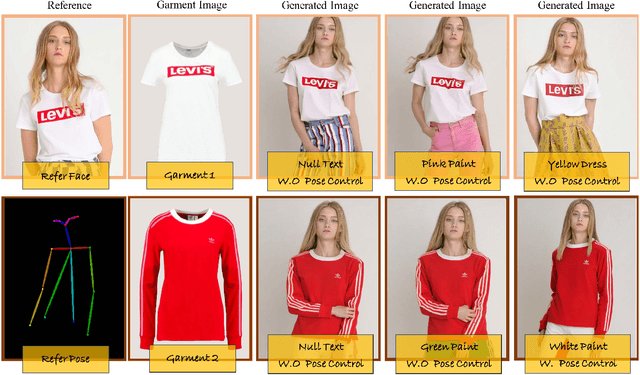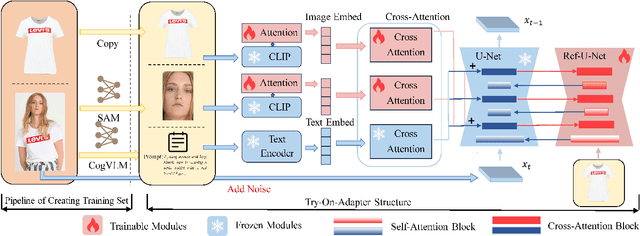Ruxue Wen
Try-On-Adapter: A Simple and Flexible Try-On Paradigm
Nov 15, 2024



Abstract:Image-based virtual try-on, widely used in online shopping, aims to generate images of a naturally dressed person conditioned on certain garments, providing significant research and commercial potential. A key challenge of try-on is to generate realistic images of the model wearing the garments while preserving the details of the garments. Previous methods focus on masking certain parts of the original model's standing image, and then inpainting on masked areas to generate realistic images of the model wearing corresponding reference garments, which treat the try-on task as an inpainting task. However, such implements require the user to provide a complete, high-quality standing image, which is user-unfriendly in practical applications. In this paper, we propose Try-On-Adapter (TOA), an outpainting paradigm that differs from the existing inpainting paradigm. Our TOA can preserve the given face and garment, naturally imagine the rest parts of the image, and provide flexible control ability with various conditions, e.g., garment properties and human pose. In the experiments, TOA shows excellent performance on the virtual try-on task even given relatively low-quality face and garment images in qualitative comparisons. Additionally, TOA achieves the state-of-the-art performance of FID scores 5.56 and 7.23 for paired and unpaired on the VITON-HD dataset in quantitative comparisons.
From Denoising Training to Test-Time Adaptation: Enhancing Domain Generalization for Medical Image Segmentation
Nov 03, 2023Abstract:In medical image segmentation, domain generalization poses a significant challenge due to domain shifts caused by variations in data acquisition devices and other factors. These shifts are particularly pronounced in the most common scenario, which involves only single-source domain data due to privacy concerns. To address this, we draw inspiration from the self-supervised learning paradigm that effectively discourages overfitting to the source domain. We propose the Denoising Y-Net (DeY-Net), a novel approach incorporating an auxiliary denoising decoder into the basic U-Net architecture. The auxiliary decoder aims to perform denoising training, augmenting the domain-invariant representation that facilitates domain generalization. Furthermore, this paradigm provides the potential to utilize unlabeled data. Building upon denoising training, we propose Denoising Test Time Adaptation (DeTTA) that further: (i) adapts the model to the target domain in a sample-wise manner, and (ii) adapts to the noise-corrupted input. Extensive experiments conducted on widely-adopted liver segmentation benchmarks demonstrate significant domain generalization improvements over our baseline and state-of-the-art results compared to other methods. Code is available at https://github.com/WenRuxue/DeTTA.
 Add to Chrome
Add to Chrome Add to Firefox
Add to Firefox Add to Edge
Add to Edge